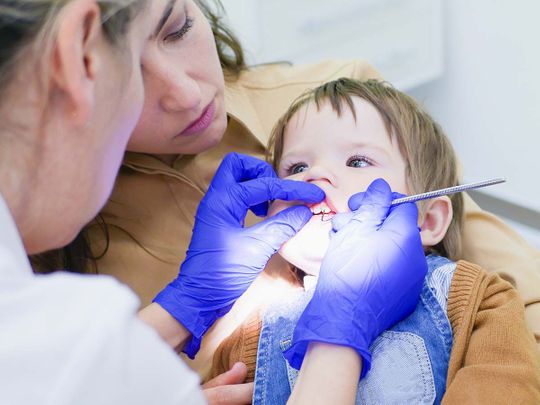
This is a tough ask – don’t let you child go to sleep with a bottle of milk or juice in his/her mouth; it may result in caries, which at best will require dental cleaning or extraction; and at worst, a root canal. Yes, that happens too.
The American Academy of Paediatric Dentistry defined early childhood caries (ECC) as “the presence of one or more decayed, missing, or filled tooth surfaces in any primary tooth in a child 71 months of age or younger.”
The World Health Organisation (WHO) reports that between 60 and 90 per cent of children are affected by dental caries.
Marcela Barreto, Dentist at DentalZorg Dubai, says caries are one of the most common chronic diseases of childhood and while unusual, even someone as young as two may need intervention, including a root canal.
What are the most common reasons for caries in kids?
Barreto explains that it is a multifactorial disease. “Bacteria, food, acids and saliva form a substance called plaque, which has properties to adhere to teeth.
“The bacteria in the plaque will feast on sugars and fermentable carbohydrates and use them to multiply, grow and metabolise it into acids that demineralise tooth structures.
“Baby teeth have thinner enamel when compared to permanent teeth, meaning that caries can grow deeper and faster on them.”
To prevent it, doctors recommend brushing and flossing on the daily alongside a well-balanced diet.
How often should a child brush? And when should they start?
Dr Enas Alkhadra, Specialist Paediatric Dentist at Dubai-based Dental Studio, told Gulf News in an earlier interview that children should be brushed as soon as they grow teeth. They should also be flossing quite early on. “A child should brush with a smear amount of toothpaste in the morning and at night. Brushing is very important. However, a lot of parents and caregivers are not aware that flossing is just as critical in keeping children’s teeth healthy. We should start flossing as soon as two teeth establish contact, usually between one to three years of age,” she said.
US-based Johns Hopkins University lists the following symptoms that point to tooth decay in children:
- White spots begin to form on the teeth in areas affected. These spots mean that the enamel is starting to break down. They may lead to early sensitivity in the teeth.
- An early cavity appears on the tooth. It has a light brown colour.
- The cavity becomes deeper. It turns a darker shade of brown to black.
The website adds: The symptoms of tooth decay and cavities vary from child to child. Cavities don’t always cause symptoms. Sometimes children don’t know they have one until their dentist finds it. But your child may feel:
- Pain in the area around the tooth
- Sensitivity to certain foods, such as sweets and hot or cold drinks
Tooth extraction
Does that mean it’s okay for someone so young to have a root canal? Surely if the child is still in possession of milk teeth they can simply pull those infected out?
Barreto says, “Root canals are sometimes needed for younger children. A baby tooth can be deeply damaged, beyond being restorable by filling only. This can happen either by deep caries or fractures and accidents. In these cases, a root canal can be required to help the baby teeth, giving the teeth enough time to fall out on their own.

Root canals are sometimes needed for younger children. A baby tooth can be deeply damaged, beyond being restorable by filling only. This can happen either by deep caries or fractures and accidents.
“Even though baby teeth are meant to fall out, they need to stay in long enough as they assist in the development of permanent teeth, save space and guide them into proper position. When a baby tooth is lost early, the permanent teeth tend to drift and make it difficult for adult’s teeth to erupt, then the child may have bite or speech problems.”
What does a root canal do?
“Root canals are designed to remove bacteria and dead tissue from deep inside the tooth, the tooth pulp. This is the vital part of the tooth, made of blood vessels, nerves and connective tissue,” explains Barreto.
How long does a root canal for a baby take?
Barreto explains that sometimes root canals requires more than one visit. “On the first consultation, an X-ray is needed for diagnosis and for root measurement. The treatment is started to relieve pain and remove bacteria and infection.”
Patients may need some time between visits so the area can heal before the canals are filled. “Then the root canal is cleaned, shaped, disinfected and filled. X-rays may be needed during and after the treatment to check if the roots are properly filled,” she says.
Talking to a child about a root canal
Step 1: Don’t despair. “Talk to your dentist about all your concerns and stay calm. Avoid looking worried or showing anxiety about the procedure as it can make the situation worse and scare your child. The best way to keep your kid calm is to act calm,” says Barreto.
Step 2: Explain in an age-appropriate manner: “Talk to your kid about the procedure and why it is needed, helping your child to understand what will happen. Explain that there will be a medicine that prevents pain,” she adds.
What are the medicines my child will be given?
Your child will be given local anaesthesia during the procedure and antibiotics to control infection.
What’s the aftercare like?
Be prepared – there will be tears and tantrums, but it will get better. Barreto explains: “The kid’s teeth will be sore after the treatment, analgesics can be prescribed and a soft diet will help during two or three days. After the root canal treatment, a filling and sometimes a crown is needed.”
She recommends regular visits to the dentist to keep an eye on things.
How often should a child visit the dentist?
Dr Alkhadra said, “Like adults, children should see a dentist regularly. Take your child to a paediatric dentist for a check-up every six months or at least once a year. This way, we can prevent and capture issues while they are still small, and hopefully, without the need for too much intervention.”
The university’s press release states that senior author Erin C. Dunn, ScD, MPHD developed a hypothesis that the width of one variety in particular, called the neonatal line (NNL), might serve as an indicator of whether an infant's mother experienced high levels of psychological stress during pregnancy (when teeth are already forming) and in the early period following birth. Several clear patterns emerged. Children whose mothers had lifetime histories of severe depression or other psychiatric problems, as well as mothers who experienced depression or anxiety at 32 weeks of pregnancy, were more likely than other kids to have thicker NNLs. Meanwhile, children of mothers who received significant social support shortly after pregnancy tended to have thinner NNLs.
Marcela Barreto, Dentist at DentalZorg Dubai, explains: “The cortisol (stress) hormone released during pregnancy might cause mental disorders in the future for the kid and also interfere with creating the baby’s teeth enamel, that’s the reason it’s possibly detected. This subject should be more investigated before we can have any conclusions.”
Have a topic you'd like us to cover? Write to us at parenting@gulfnews.com








